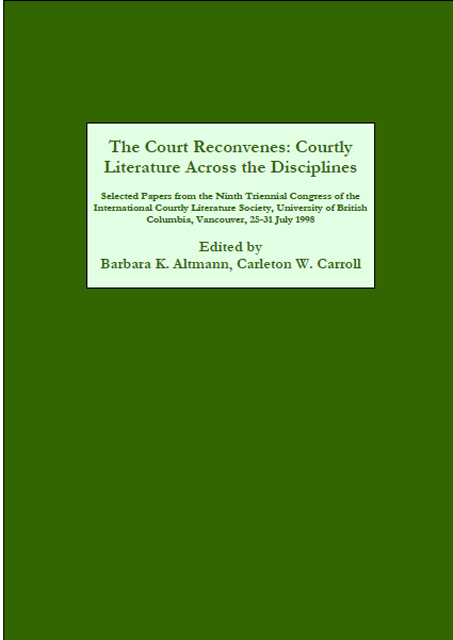 The Court Reconvenes
The Court Reconvenes Knowledge as Therapy: A Comparison between the Confessio Amantis of Gower and the Breviari d’Amor of Matfre Ermengaud
Published online by Cambridge University Press: 31 March 2023
Summary
It is a commonplace that, with age, comes wisdom, based on our knowledge and experience of the world. It is also said, on the other hand, that there is no fool like an old fool. Certainly, in this paper, I shall be addressing remarks in relation to my two chosen works which will have bearing on both statements. Not that it will be the whole story for, as I intend to show, they both aspire to demonstrate the rich panoply of summas in which the Middle Ages abound, even if their central themes contain much which is part of the lore of love and reserve a few surprises for the dedicated reader.
Whether, at the end of my exposition, you, the readers, will also wish to apply the second statement to the writer but not the first, remains a matter of conjecture. Certainly, that someone who has devoted much of a career to the diffusion and celebration of mainly Medieval Occitan texts should launch into a comparison of the Breviari d’amor with a Middle English text may seem surprising to many and to some even injudicious. Indeed, I, too, am uncertain why I ever took on this topic. But no one twisted my arm. My sole concern was to deliver a plenary on a subject which would be of interest to the broad sweep of colleagues in attendance at the conference, as was the case for the subjects chosen by the four other plenary speakers.
I console myself in part with the fact that I do know one of the two texts well – the fourth and last volume of text of the Breviari has been deciphered in the base manuscript and, with the help of my collaborator, Cyril Hershon, we should see the publication of volume 4 in the year 2004, when the other eleven manuscripts have been transcribed for the 11,000 lines it will contain.
But, how does it come about that the other text I am talking about is John Gower's Confessio Amantis? Well, you have to thank Derek Pearsall for that. Knowing that I was to be in Boston in 1990, Derek was kind enough to invite me to speak to the English Department staff/postgraduate medieval seminar at Harvard.
- Type
- Chapter
- Information
- The Court ReconvenesCourtly Literature across the Disciplines: Selected Papers from the Ninth Triennial Congress of the International Courtly Literature Society, University of British Columbia, Vancouver, 25-31 July 1998, pp. 57 - 70Publisher: Boydell & BrewerPrint publication year: 2002
- 1
- Cited by


